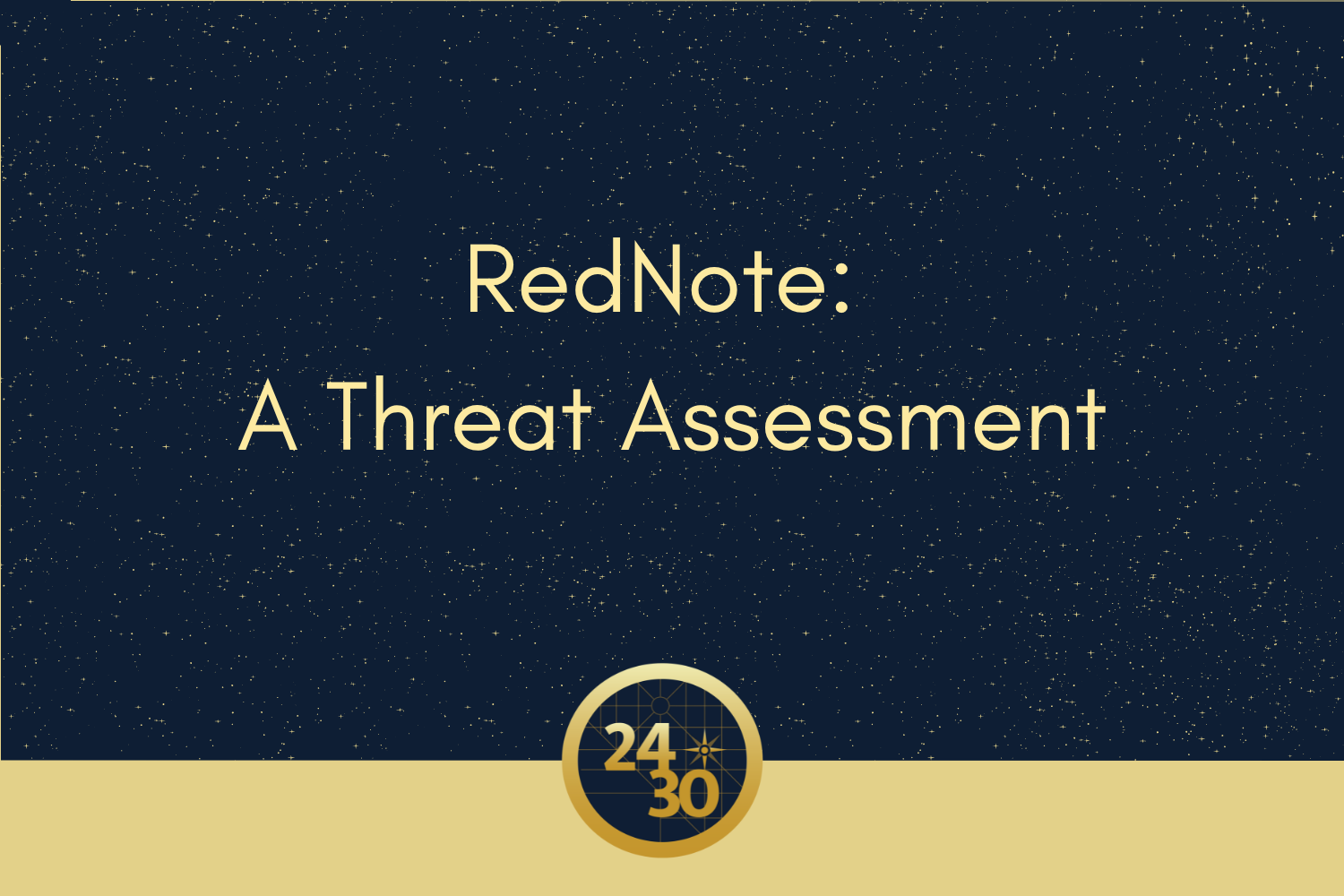Red Report Live
For those who wish a more in depth discussion of Red Report analyses, please sign up for Red Report Live, a one-hour discussion with the authors. To sign up, please email redreport@2430group.org.
How the CCP is taking aim at US companies
Weaponizing Business; Two visits to China with two starkly different takeaways; TikTok Redux: the US and China Strike a Deal; How China’s AI and Robotics Roadmaps Signal Resilience Beyond Chips; Exporting Espionage
Our Research
China, Hong Kong, and Russia’s Intelligence and Counter-Espionage Laws
This document is a categorized reference list of the major laws, regulations, and frameworks that shape the People’s Republic of China (PRC), Hong Kong, and Russia’s contemporary national-security and counter-espionage environment.
RedNote: A Threat Assessment
RedNote, a short-form video and augmented reality platform better known in Mandarin as xiaohongshu, or “little red book,” has rapidly gained traction in recent years as an alternative to the video blogging service TikTok, especially among younger users drawn to its immersive alternate reality features and tailored content feeds. Like TikTok, RedNote offers algorithmically driven entertainment; however, its underlying infrastructure and legal obligations differ in critical ways. While TikTok has faced scrutiny over its Chinese parent company, ByteDance, and its opaque data practices, RedNote is even more closely aligned with the People’s Republic of China’s (PRC) surveillance architecture. Promoted as a creative social app, RedNote conforms to PRC policy of surveillance-by-design, requiring extensive data extraction, non-transparent content moderation, and legally mandated state access to user information. This closer look examines how RedNote operates within—and extends—the global reach of China’s digital governance model.
The author, Christian Ryan, is an open-source national security researcher and a Research Fellow at Trefoil Strategies Ltd., a Pittsburgh-based risk consultancy.
The Economy as Battlefield: The 21st Century Sino-American Cold War
2430 Group’s Director, Glenn Chafetz describes a 21st Cold War with China in a May 20, 2025 article in Publications—Irregular Warfare Center. Chafetz contends that the Chinese Communist Party (CCP) centrally directs the entirety of its party-state-economic machinery, including its putatively private companies, against the decentralized, civilian assets of the United States’ commercial sector, critical infrastructure, and civil society. The US fails to adequately respond or deter China because the attacks are incremental and hard to detect; the private sector lacks the ability and incentives to defend itself; and neither the USG nor the private sector adequately capture the risks of inaction.
Why the North Korean Remote IT Worker Threat Persists and Continues to Damage U.S. National Security
2430 Group Director, Glenn Chafetz writes in the April 25, Fletcher Forum of World Affairs that both the US government and private firms are now well aware of the infiltration of remote North Korean IT workers in the computer systems of thousands (if not tens of thousands) of US private sector computer systems. Yet, the response is nowhere near up to the task of solving the problem. The government lacks the resources to protect hundreds of thousands of US companies, and the companies themselves underestimate the risks of the problem to their operations, in part because of poor detection and reporting. Consequently, they take the path of least resistance and lowest immediate cost, which is doing nothing. Managers need to understand that this is not just a national security threat, which they should care about, but a business threat that can destroy revenue and value via ransomware, sabotage, and intellectual property theft.
America should embrace weaponized interdependence against China
2430 Group Fellow Michael Frank writes for the Project on Technology and National Security that US export controls on AI chips under the last two administrations have produced negative, unintended consequences. These include the acceleration of China’s native development of technology and a simultaneous loss of US leverage over China’s behavior. A more effective strategy would be to allow exports of some critical technology that would foster an instrumental dependence which could be exploited when useful to the United States.
A Cost/Benefit Analysis of the New US-Russian Relationship
In an article published in Modern Diplomacy, 2430 Group Director, Glenn Chafetz analyzes the US tilt toward Russia and finds that any benefits accruing to the United States from this policy would be small, dependent on the actions of unreliable partners, and in the future. The costs, by contrast, are significant and immediate.
The end of nonproliferation?
Glenn Chafetz, director of 2430 Group, and Zachary Davis, author and former intelligence analyst, warn in this Defense One that the Trump administration's shift towards unilateral foreign policy is undermining nuclear nonproliferation, prompting more countries to pursue nuclear weapons. This will increase global instability and conflict, offering no clear benefits for U.S. security.
The US dividing Russia from China? Forget about it
2430 Group’s Director, Glenn Chafetz explains in this article in The Strategist why splitting Russia and China is wishful thinking. Russia has many more key interests in common with China than it does with the United States.
China’s War Plans
2430 Group’s director Glenn Chafetz urges U.S. and allied leaders to recognize that Xi Jinping’s deep insecurity and need for absolute control are accelerating the pressure and timeline for him to use the PLA against Taiwan—and the time to prepare is limited.
Arming Our Adversaries: The Inadequacy of US Chip Controls
US and allied export controls are failing to stop critical microelectronics from reaching sanctioned adversaries like Russia and Iran. Weak supply chain oversight, inconsistent due diligence, and industry resistance to stricter controls have enabled a global gray market for these components, undermining national security and costing American lives.
This paper analyzes the widespread availability of US components used in Russian unmanned aerial vehicles (UAVs), and specifically:
documents the methodology used to track critical components and their
distribution channels;presents four detailed findings that reveal significant vulnerabilities in the semiconductor supply chain and distribution networks; and
offers five practical recommendations for government and industry to help disrupt the flow of US technology to adversary states.
Why Do We Tolerate Beijing’s Belligerence?
Tom Lyons, co-founder of 2430 Group, asserts in the Wall Street Journal that too many U.S. companies have meekly accepted a general subjugation to the Communist Party’s new order.
The U.S. Needs a More Accurate Estimate of China’s Commercial Espionage
2430 Group Director Glenn Chafetz contends that the true value of Chinese IP theft from the US private sector every year is not $225-$600 billion, but north of $5.7 trillion, because the lower numbers ignore undetected and unreported thefts. Furthermore, by incorrectly relying on the faulty lower numbers, US managers grossly misconceive their risk and thus fail to take action to secure market share, higher revenues, and profits. Taking these actions is not just good counterintelligence; it's smart business.
Mapping Iran’s Media Influence
2430 Group visualizes Iran’s centers of elite power and how different players utilize different media operations to further their own agendas.
How China is attempting to influence US elections
China is increasingly its espionage and infiltration techniques against the US in the lead up to the November 2024 election. 2430 Group summarizes some of the CCP’s most prominent techniques.
Chinese Cars as Military Threats? It’s Not Science Fiction
Glenn Chafetz, Director of 2430 Group, writes in The Cipher Brief about concerns over Chinese-manufactured vehicles and their software as national security threats, highlighting potential military applications of Chinese networked vehicles and Low Earth Orbit satellites.
The U.S. Can Provide an Alternative to China in Sub-Saharan Africa
Glenn Chafetz, Director of 2430 Group, and Ben Kallas, CEO and co-founder of Searchlight, write in World Politics Review about how China's influence in sub-Saharan Africa faces challenges exemplified by the situation in Zambia, where diverse local perceptions and the presence of autonomous Chinese operators present opportunities for Western engagement to counterbalance China's dominance in critical mineral resources.
How China’s Intelligence Law Backfired
Glenn Chafetz, Director of 2430 Group, writes in The Cipher Brief about how China's 2017 National Intelligence Law, requiring citizens and companies to cooperate with intelligence services, has led to increased international scrutiny and bans on Chinese companies over espionage concerns, despite China's denials and protestations.
Fox in the Henhouse: The Growing Harms of North Korea’s Remote IT Workforce
Glenn Chafetz, Director of 2430 Group, writes in The Diplomat about how Pyongyang has infiltrated its IT workers into contractors and subcontractors serving the United States’ largest and most profitable companies.
Business Intelligence Report: The Chinese Vaping Industry
This report provides an overview of the Chinese vaping industry, highlighting notable companies and their connections to the government of the People's Republic of China (PRC).
Russia and China are part of the same problem for the United States
According to 2430 Group’s director, Glenn Chafetz, Members of the US Congress who oppose further military aid for Ukraine often seek to justify their position by claiming that China rather than Russia presents a greater danger to the United States. They argue that the rise of China means it is in American interests to accommodate Russia, while it should be up to Europe to shoulder the burden of Ukrainian security.





















